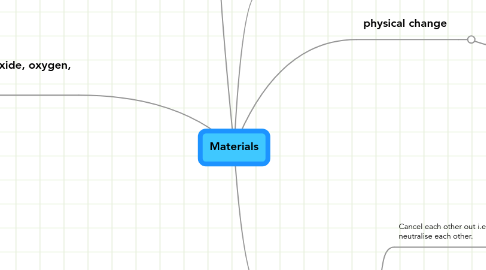
1. chemical change
1.1. New substance formed
1.1.1. Hard to get back the original chemicals.
1.1.2. might be.....
1.1.2.1. a colour change
1.1.2.2. heat or light given out
1.1.2.3. a gas produced
1.1.2.4. a new smell
2. carbon dioxide, oxygen, hydrogen.
2.1. Carbon dioxide
2.1.1. Add marble chips and hydrochloric acid together to make it.
2.1.1.1. Turns limewater milky.
2.1.1.2. Heavier than air.
2.1.1.3. Doesn't let things burn so good for putting out fires.
2.1.1.4. Made during respiration and also during burning.
2.2. hydrogen
2.2.1. Add hydrochloric acid and magnesium together to make it.
2.2.1.1. Puts a flame out with a pop
2.2.1.2. lighter than air
2.3. oxygen
2.3.1. Relights a glowing taper.
2.3.2. Needed for respiration.
3. physical change
3.1. No new chemical formed. Only the form of the substance changes e.g. ice to water.
3.1.1. Can easily ge tback the original substance e.g. cool the water down to get back the ice.
4. acids and bases
4.1. Cancel each other out i.e. they neutralise each other.
4.1.1. Litmus goes red in acids and blue in bases and won't change colour if something is neutral.
4.1.2. pH is a scale of how acidic or basic something is
4.1.2.1. The scale goes from 1 to 14. 7 is neutral e.g. water, above 7 is basic and below 7 is acidic.
4.1.2.1.1. Universal indicator has a whole range of colours that help tell is the pH.
4.2. Uses
4.2.1. HCl is the acid in the stomach.
4.2.2. Car batteries have sulfuric acid in them.
4.2.3. Some cleaners have ammonia in them and they are bases.
